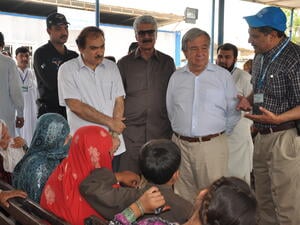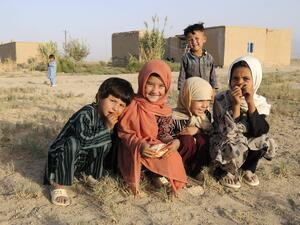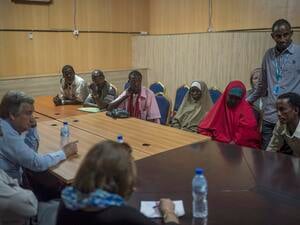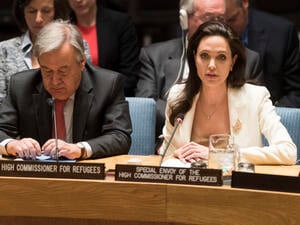UNHCR chief visits Ecuador ahead of World Refugee Day
UNHCR chief visits Ecuador ahead of World Refugee Day

High Commissioner António Guterres meets an Afro-Colombian refugee near Guayaquil.
QUITO, Ecuador, June 19 (UNHCR) - UN High Commissioner for Refugees António Guterres returned to Ecuador at the weekend and pledged to continue working to ensure the rights of the largest refugee population in South America.
Making his third visit to Ecuador for UNHCR, Guterres met urban refugees from Colombia and discussed the challenges they face - including problems with documentation - during his visit to the port of Guayaquil and to the capital, Quito. He also attended a bicycle jamboree in the city's Carolina Park, which was organized as part of events for World Refugee Day (June 20) to show support for a "socially committed, inclusive and non-discriminatory" Ecuador.
In Guayaquil, the High Commissioner met female Afro-Colombian refugees who had fled violence in southern border areas of Colombia. They told Guterres that their main concern was obtaining an identity document, which would change their life by enabling them to access basic services and exercise their rights.
"I came here because of the violence in my country. I did not have any choice. Here I am safe, but I am having difficulties with the refugee cards," said a 30-year-old woman. She claimed that this document had not been recognized by the government and she could not work. "My two children cannot go to school and I can't open a bank account."
Others said they faced discrimination as women or because they were Afro-Colombian. "My girl doesn't want to go university anymore," another woman told Guterres, adding that she been taunted with sexist slurs by other students. About 70 per cent of the 56,000 registered refugees in Ecuador are women or children.
Guterres condemned such behaviour and stressed: "We must join forces - politicians, responsible media and civil society organizations and all the people - to make a firm stand against xenophobia and racism."
The High Commissioner also told the Colombian women that UNHCR was still learning how to work in urban contexts, although more than half of the world's refugees now live in towns or cities rather than camps. "It is only a year since we opened our office in Guayaquil and we are aware that more and more refugees are coming to cities," he said.
Guterres also pledged that "UNHCR will continue working with the Ecuadorean government to ensure good implementation of the legal framework for protecting refugees or to bridge the gap between the legal framework and the reality."
At the cycling event in Quito, Guterres also visited a food, music and handicrafts fair, where Colombian refugees and Ecuadoreans displayed their products. "We have come here to work and to give our families a better life," said one vendor. "My children were not safe in Colombia, but in Ecuador we all feel safe."
High Commissioner Guterres, lauding the multi-cultural, multi-ethnic event, stressed the need for tolerance and the benefits of diversity. "It is important for tolerance to prevail, for people to learn to live together and understand that diversity is wealth," he said.
Before wrapping up his visit, the UNHCR chief visited a shelter for refugee women who have been the victims of sexual and gender-based violence (SGBV). He said UNHCR placed a priority on countering SGBV.
"To ensure protection for women, it is important to work with governmental and civil society institutions, and also to empower refugee women," said Guterres. The High Commmissioner left Ecuador on Monday for Brazil, where he will attend the UN Conference on Sustainable Development, or Rio+20.
By Francesca Fontanini and Andrea Durango in Quito, Ecuador







